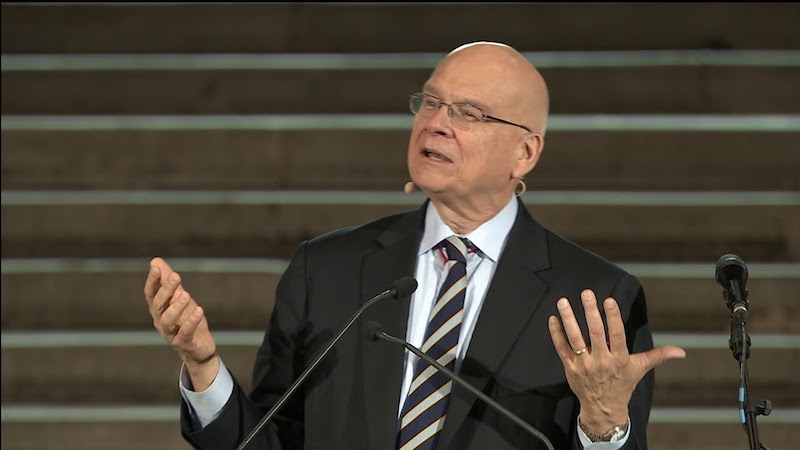What does it look like for Christians to be “salt and light” in the modern age?
In the recent keynote address at the National Parliamentary Prayer Breakfast, Tim Keller spoke to Prime Minister Theresa May and over 140 MPs about the cultural influence of Christianity, past and future.
“What can Christianity offer our society in the 21st century?” asks Keller, who will be the guest speaker at the Acton Institute’s 28th Annual Dinner this October. “And I’d like to answer that question from the last verse [Matthew 5:13] that was just read to you…’You are the salt of the earth. But if the salt loses its saltiness, how can it be made salty again? It is no longer good for anything, except to be thrown out and trampled underfoot.’”
Keller begins by highlighting the many contributions of Christianity to Western civilization, from the creation of our systems of order and justice to the development of ethics and our modern notions of human rights.
“The point is that you have been shaped by Christianity,” Keller explains. “Your moral sense is not the moral sense of an eastern or ancient ‘shame and honour’ culture, in which strength is the most important thing. You have an other-regarding ethic of love, and that came from Christianity. Because the [Christian] monks came saying, ‘it doesn’t matter the social class of the person — it doesn’t matter your social class or their social class — everyone must be loved for their sake.’”
Yet with the rise of modernity, we’ve seen the moral foundations of those ethics begin to shift. On the surface, many of those Judeo-Christian contributions seem to have survived, but at their core, the sources have drifted from the Gospel’s particular ethic of love and self-sacrifice. “On the one hand, we have the highest moral ideals of any culture in history,” he says: “we believe in the equality of every single human being, we believe that we should be seeking justice for every class, for every national group, for every race…On the other hand modern culture tells you that all moral value is socially constructed or maybe the product of our evolutionary biology — that all moral value is basically a subjective preference.”
Grasping for some moral source to justify our ethics, modern society has increasingly turned to self-actualization — distorting our notions of liberty, meaning, community, and individual identity all along the way. There’s plenty of “Christian frosting” when it comes to the basic ideals, but we have shifted our foundations to a point where we are no longer equipped to preserve them. By putting the self at the center and self-denial to the wayside, we are paving the way for massive civilizational regression, never mind the spiritual implications. “Our culture increasingly is a consumeristic culture, it’s an individualistic culture and it teaches self-actualization,” Keller explains. “It teaches self-assertion and it teaches you never to do self-renunciation — never do that.”
When it comes reforming our economic and cultural institutions, we see the ripple effects rather clearly.
Everyone claims the mantle of equality and justice and the goal of “changing the world for the better,” but due to our vacuum of moral foundations, few are actually equipped or prepared for the hard and steady sacrifice that’s truly required. As Keller explains:
Can we form people anymore in our society who can support those ideals because those ideals take self-sacrifice? The way [philosopher] Charles Taylor puts it is like this: we tell people, especially our young people, we say: you’ve got to be true to yourself. You’ve got to follow your own inner light. You can’t tell anybody what’s right or wrong for you. And not only do you have to be true to yourself, you have to be true to yourself no matter what your family says, or what your community says, or what society says. You don’t sacrifice for them. You make them adjust to you.
But then we say to them: but then you have to actually work for justice, and you have to work to alleviate hunger – which of course takes sacrifice. What that does is it takes giving up power; it takes giving up wealth; it takes giving up all sorts of things. So how are they gonna do that?
To remain “salty” in the modern age, Christians need to remember that basic ethic of self-sacrifice and renew our actions and cultural imaginations accordingly.
When the culture points us toward idols of consumerism and self-actualization — telling us to “follow our passions” and “be who we want to be” — we respond instead with extravagant generosity and an others-oriented perspective. When the culture points us toward the idols of libertinism — telling us that freedom is found in blind self-determinism — we remember that true liberty is found in taking up our crosses and freely pursuing that which we ought.
“That’s where the infinite value of the human soul comes from, Christians,” Keller concludes. “You’re only going to be of benefit to society if you stay different — if you don’t become like the society: self-actualizing. If you stay self-sacrificers and self-givers.”
Tim Keller will be the guest speaker at the Acton Institute’s 28th Annual Dinner in Grand Rapids, MI, on October 17. You can register here.

